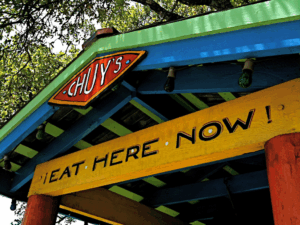Introduction
- The power of visual food merchandising in driving consumer behavior.
- How effective brand marketing collateral can transform food sales.
- Overview of categories and common challenges in food merchandising.
Understanding Food Merchandising
What is Food Merchandising?
- Definition and its role in the food industry.
- Key objectives: attraction, communication, and persuasion.
Importance of Printed Communications
- How printed materials impact consumer decisions.
- Examples of printed materials: menus, signage, and promotional tools.
Categories of Brand Marketing Collateral
Signage
- Entrance
- Importance of a welcoming first impression.
- Examples: Entrance signs, welcoming boards.
- Menu Boards
- Driving decisions with clear, compelling menus.
- Focus on high-margin items.
- Door and Window Clings
- Attracting attention from passersby.
- Price Signs
- Clarity in pricing to reduce customer hesitation.
- Table Tents
- Promoting daily specials or high-profit items directly at the table.
Design Collateral
- Murals and Framed Photos
- Creating an ambiance that aligns with the brand.
- Large Format Posters
- Catching the eye with bold visuals.
- Placemats and Coasters
- Subtle yet effective branding touchpoints.
Marketing Materials
- Menus (Regular, To-Go, Mini)
- Adapting menus for various dining experiences.
- Stickers and Coupons
- Building brand loyalty and promoting return visits.
- Door Hangers and Flyers
- Engaging with the local community.
- Catering Information
- Encouraging larger-scale orders.
Business Collateral
- Business Cards and Postcards
- Essential tools for networking.
- Flyers and Promotional Stationery
- Keeping customers informed of promotions and updates.
- Presentation Folders
- For professional engagements and partnerships.
Prepared Foods Collateral
- Labels and Recipe Cards
- Informing and educating customers.
- Demo Kits and Header Cards
- Driving in-store engagement and awareness.
Wholesale Collateral
- Sell Sheets and Brochures
- Showcasing product ranges to potential buyers.
- Product Booklets and Case Cards
- Comprehensive product marketing.
Tradeshow Collateral
- Display and Table Covers
- Representing the brand professionally at events.
- Magnets and Ad Specialties
- Keeping the brand top of mind.
Uniform Collateral
- Hats, Aprons, and Shirts
- Enhancing team presentation.
- Pants and Chef Jackets
- Combining professionalism with functionality.
Common Problems in Food Merchandising
Problem 1: High Costs
- Analysis of ROI challenges in printed merchandising.
- Impact of poorly designed materials on profitability.
Problem 2: Ineffective Messages
- Examples of messaging pitfalls: unclear offers, poor call-to-action.
- The importance of persuasive writing.
Problem 3: Technical Issues
- File preparation and printing challenges.
- Ensuring technical accuracy for high-quality output.
Solutions to Food Merchandising Challenges
Addressing Unprofitable Menus
- Layout Consulting
- Optimizing placement for high-margin items.
- Food Costing
- Balancing menu pricing with profitability.
- Re-Designing Menus
- Leveraging compelling design principles.
Improving Signage and Menu Boards
- Professional Merchandising Consulting
- External review for actionable insights.
- Enhancing Visibility
- Ensuring legibility and strategic placement.
- Streamlining Logic
- Making messages clear and intuitive.
Capturing Missed Merchandising Opportunities
- On-Site Merchandising Analysis
- Identifying overlooked areas for improvement.
- Highlighting Food Visuals
- Using photography to tempt customers.
- Operational Analysis
- Holistic review to uncover hidden inefficiencies.
Benefits of Professional Assistance
- Increasing check averages with strategic menu layouts.
- Enhancing customer flow with effective signage.
- Boosting impulse purchases through suggestive designs.
- Achieving results with high-quality visuals and writing.
Conclusion
- Summary of key points and the importance of strategic food merchandising.
- Encouragement to seek professional consultation for optimal results.
FAQs
- What is the most important element in food merchandising?
- High-quality visuals and persuasive writing.
- How can signage improve customer flow?
- By guiding customers effectively with clear messages.
- What are the common pitfalls of DIY merchandising?
- Poor design quality, ineffective messaging, and high costs.
- How do professional consultations help?
- By identifying and solving specific challenges in merchandising.
- What is the ROI of effective food merchandising?
- Increased sales, better customer engagement, and enhanced brand loyalty.


